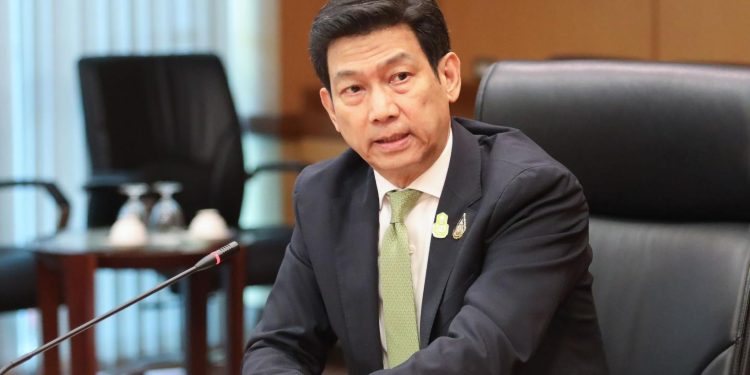The Thai government has called for the “immediate full release” of Myanmar democracy leader Daw Aung San Suu Kyi and former president U Win Myint following reports they were transferred from prison to house arrest this week.
The military arrested State Counselor Daw Aung San Suu Kyi and then-president U Win Myint when it staged a coup against their elected government on Feb. 1, 2021.
Junta courts sentenced the 78-year-old Nobel laureate to 27 years in prison and the president to eight years on charges widely considered to be politically motivated. People across Myanmar and the international community have since called for their release.
On Tuesday, a regime spokesman said the duo had been transferred out of prison in a move to protect vulnerable inmates during Myanmar’s summer heatwave.
Thai Prime Minister Srettha Thavisin welcomed news of their transfer.
“Look forward to further positive steps soon,” he tweeted on Wednesday.
Thai Foreign Minister and Deputy PM Parnpree Bahiddha-Nukara echoed that message in a statement issued the same day.
“The Thai government calls for further positive steps in this direction leading to their immediate full release in order to advance the implementation of the ASEAN [Association of Southeast Asian Nations] Five-points consensus [sic],” said the statement.
The Five Point Consensus peace plan was signed by all 10 ASEAN members including Myanmar and Thailand after the junta’s violent crackdown on coup protests sparked an armed national uprising against military rule. The consensus calls for the immediate cessation of violence and implementation of peace talks between all parties, but it has gone largely ignored by the junta.
Thailand, which shares a 2,400-kilometer border with Myanmar, is seen as close to the junta leadership. Bangkok prizes stability above all in its relations with Myanmar, which is a major trade partner.
The Thai government has also angered some ASEAN partners by conducting informal meetings with the junta involving India and China, both of whom have major investments in neighboring Myanmar.
Last year, the junta permitted then-Thai foreign minister Don Pramudwinai to visit Daw Aung San Suu Kyi in Naypyitaw, making him the first outsider to meet the jailed leader since the coup.
Thailand recently dispatched its first batch of aid to war-torn border areas of Myanmar via a newly established humanitarian corridor. However, the effort has been criticized for failing to reach needy populations outside junta-controlled areas.
The junta is now struggling to maintain its grip on the country amid a series of battlefield defeats and losses of towns and bases to ethnic armed groups and allied resistance forces.
The military setbacks prompted PM Srettha to declare early this month that the Myanmar military regime is weakening.
Srettha spoke shortly after Karen ethnic rebels and allied forces attacked the major trade hub of Myawaddy on the border with Thailand, seizing key army bases.
The fall of Myawaddy triggered a border security crisis for Thailand as civilians fled to escape retaliatory junta airstrikes and soldiers from the last battalion defending the town took shelter near a bridge linking Myawaddy with the Thai town of Mae Sot.
In response, Srettha instructed Thai armed forces to secure the border and bar Myanmar warplanes from entering Thai airspace.

















